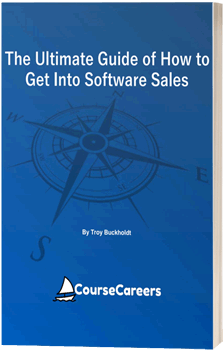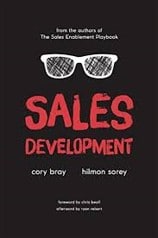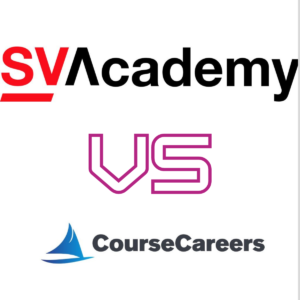This ultimate guide will show you exactly how to get into software sales. You will learn everything needed to get into software sales without a degree or experience. These entry-level software sales jobs are also known as business development or sales development representative jobs.
This guide comes from my personal experience trying to start my sales career directly out of high school. After deciding that college was not the best path for me, I began learning all about sales and even decided to specialize in technology sales by learning sales development skills.
I thought that this would allow me to become so valuable to a company that perhaps they would choose me over a college graduate with more experience. I was right. At age 18, I started working in software sales as a sales development representative for a startup company in one of Atlanta’s technology incubators. Here is the ultimate guide for how you can get into software sales too.

Download The Free PDF Ebook of The Ultimate Guide of How to Get Into Software Sales
Contents
Chapter 1: Companies Perspective
Chapter 2: Specializing
Chapter 3: Learning
Chapter 4: LinkedIn & Resume
Chapter 5: Google Presence
Chapter 6: Target Companies
Chapter 7: Applying
Chapter 8: Interviewing
Chapter 9: Conclusion
Chapter 1
How to Get Into Software Sales by Understanding the Companies Perspective
“Have you ever wondered why companies require you to have a degree even when it wouldn’t benefit the sales job?”
In this chapter we will discuss the following subjects:
Why companies require degrees
Who makes the hiring decision
Why Companies Require Degrees for Software Sales Jobs
Companies require degrees for 3 main reasons.
- Too many applicants: Most of the time when a company posts a job for an entry-level sales position a bunch of people apply to it due to the low barrier of entry. There isn’t much to go off of when looking through applicants either, so it’s mostly based on soft skills. The companies also don’t have time to interview everyone, so it puts companies in a very easy position to think that candidates with a degree are probably more motivated and have better soft skills. This means there is a good chance anyone without a degree is screened out before they even read the resume.
- Companies don’t want to get sued: The government has made it very hard for HR professionals and recruiters to legally weed out candidates that aren’t qualified without running the risk of getting sued. The easiest way around this is by filtering based on formal education which is completely legal. Thanks, government.
- Attract the best people: When people look at a job description that requires a degree they are more prone to think it’s a better, more exclusive job. This helps attract college graduates that don’t want to think their degree was a waste and be considered underemployed. This means that even if companies say they require degrees, many actually don’t.
Who Makes the Hiring Decision for Software Sales Jobs
There are two main types of people you need approval from to get from the application to the software sales job offer.
Human Resources & Hiring Manager
Human Resources
The human resources department or recruiter is normally the first person who sees your application (if they see it at all). This person is responsible for finding the cream of the crop. They are told by the hiring manager what type of person they need and what to look for.
They start by looking at the format of your resume to see how well it’s organized, then proceed to look at your most relevant experience. This experience is normally anything sales related since this is an entry-level sales position.
If they can’t find anything, then they look at your education and see what you majored in. If it’s something relevant or they don’t have enough good candidates then they will probably schedule a phone screen.
If they can’t find something that would make them think that you would be a good fit, or if they have too many good candidates then you will probably not hear anything back from them.
Hiring Manager
The hiring manager is normally the person who is looking for someone to add to their team. They are responsible for managing their team’s performance, hiring new reps, training new reps, and sometimes even closing deals.
This person would be directly responsible for managing the new hire, so they want someone who would work well with them and their team.
They also want someone who is dependable and has a good work ethic. They want to know that they can be trained to do the role effectively as soon as possible while not jumping ship.
This is where the previous experience or expertise comes into play. They are very concerned with lowering the risk for Their hiring decisions. They need to truly believe that if they hire this person that there is a very good chance he or she will be successful.
If for whatever reason they aren’t successful, then it’s the hiring manager that will be questioned, especially if they hired someone without a degree.
Chapter 2
How to Get Into Software Sales by Specializing
“Have you ever wondered why you are forced to learn things in school that you know will never be applicable to your job?”
In this chapter we will discuss the following subjects:
How to get into software sales by specializing your education
Available specializations for sales
How to choose a software sales specialization
How to Get Into Software Sales by Specializing Your Education
Millions of people go to college every year to learn very broad subjects. Some of the most popular things to study are psychology, business, communications, etc.
The problem with these types of studies is that people start with the education and then search for a role where it can be used.
This normally doesn’t work too well because companies require a much different skill set and expertise than what people learn in college. This makes college an extremely ineffective way to start your career. There’s also no degree that’s even close to being relevant to teaching students software sales.
This does, however, give people who specialize in software sales a huge advantage since they can easily stand out in that role when being compared to generalists with a college degree.
If you do have a degree, then specializing has the same effect of differentiating you from all the other college graduates who don’t have the particular skill set or knowledge required to be successful in sales.
There are many different roles which someone can specialize in. It could be a particular type of sales, marketing, customer service, analyst, etc. For the purpose of this guide, we will only be talking about sales.
Available Specializations For Sales
There are two main types of sales: B2C and B2B
- Business to Consumer sales is normally more entry-level such as retail sales or insurance sales. You could also sell higher ticket items such as houses, boats, or planes.
- Business to Business sales is where most salespeople are able to make large amounts of money. They could sell anything from software to printers to professional services.
Inside Sales VS Outside Sales
- Inside sales is where you work inside an office and spend the majority of your time on the computer. You connect with people through three main channels: phone, email, social.
- Outside sales is where you go out of the office to meet with prospects. You can meet at someone’s house if its B2C or at an executive’s office if its B2B.
Type of Industry
There are many types of sales industries you can also specialize in. Here are a few in B2B sales:
- Software
- Hardware
- Medical
- Professional services
Choosing a Software Sales Specialization
What’s Hot
I would start by doing research on the sales position you’re interested in and seeing if it’s in high demand. Choosing a role that companies are struggling to hire enough people for is key as it will make getting a job so much easier.
Entry Level
Is this an entry-level role, or do you need a lot of experience to break into it? Make sure there is an entry point into the industry before you choose to specialize in it.
Natural Interests & Abilities
If you absolutely hate software, then don’t work in it! Choose an industry you are attracted to and would enjoy becoming an expert in.
Chapter 3
How to Get Into Software Sales by Learning
“The only way to become a specialist in software sales is by putting in the time to learn everything about it”
In this chapter we will discuss the following subjects:
Figuring out what to learn
Ways to learn
Figuring Out What to Learn for Software Sales
Before you go ahead and start trying to learn everything, you want to get a general idea of what skills & knowledge is required to do the role effectively.
Skills & Knowledge
Skills
- Hard skills are the ones you are able to prove you know without saying a word. These could be things such as computer literacy, proficiency in Microsoft Office, and a strong understanding of CRM software.
- Soft skills are the ones you are able to prove you know by talking to someone. These could be things such as being a good listener, critical thinking, and the ability to hold a strong conversation.

Knowledge
Knowledge is the expertise you have on a particular subject. In sales, these could be things like how to write effective cold emails based on buyer personas, or a thorough understanding of different sales processes.
It could also be knowledge of the industry your selling in such as an understanding of software as a service.

Read sales development job descriptions
To understand what skills and knowledge companies want you to learn for software sales, you need to read every relevant job description you can find for it.
Look for correlations: Start looking for commonalities between what all of the companies require.
Create a list: Put together a list of all the hard skills, soft skills, sales knowledge, and industry knowledge that companies are looking for in your sales specialization. We’ve already done this for you if you go through our software sales training program here at CourseCareers.
Once you have your list of all the most important requirements for the role, the next step is to understand which skills you need to acquire or improve.
If you realize that some of the required soft skills are ones you don’t possess or don’t wish to possess, then it might be smart to think about choosing a different specialization that requires a different skillset. Such as strong analytical skills vs very good phone communication skills.
How to Learn Software Sales
There so many great resources out there to learn from which are either free or nearly free.
● Books
● Online courses
● Blogs
● Youtube Channels
● Podcasts
● Organizations
I suggest you start by searching for very broad books & courses on sales development as they will help give you an idea of the bigger picture.
You can normally do this by simply searching for “books on sales development”. You can then use other resources such as blogs from the top companies in the industry to learn some of the best practices and details. Our software sales training course teaches you everything you need to start your career with zero guesswork.


Chapter 4
How to Get Into Software Sales With a Great LinkedIn Profile & Resume
“LinkedIn is the new resume. It is absolutely essential to have a good LinkedIn profile in this day & age to get a software sales job.”
In this chapter we will discuss the following subjects:
Why LinkedIn is important
Profile tips
Resume
Why LinkedIn Is Important for Getting Hired in Software Sales
Having a bad LinkedIn profile is a surefire way to instantly kill your prospects of getting hired as a sales development representative
Dead or Alive
Dead: One of the first things hiring managers or recruiters do when they get an application is look at the applicant’s LinkedIn profile. If you have a bad profile, they will judge you heavily for it. This is especially true if it’s for a B2B sales position since LinkedIn is such an important part of B2B sales.
Alive: While LinkedIn is a good way to kill your application, it’s also a very good way to position yourself to get ahead. If a hiring manager looks at your LinkedIn profile and is impressed, then you are one step closer to a job interview.
Profile Tips
Pro Tip #1
Get professional pictures taken of you for your profile. At the time of writing this, JCPenney’s had them for around $30.
Pro Tip #2
Get at least 500+ connections. On LinkedIn, your profile only displays up to 500 connections. It makes you look much more professional by having the maximum number. Trust me.
Pro Tip #3
Start connecting with everyone who works in software sales. This could be an entry-level person, manager, or thought leader. By doing this, it shows recruiters / hiring managers that you have a lot of common connections and are deep in the industry.
Pro Tip #4
Find people who work in the software sales job you are aiming for and see how their profile looks. Mirror the best profiles you can find. As a general rule, talk about accomplishments & responsibilities in your previous roles rather than just what your day to day was like.
Pro Tip #5
If you don’t have a degree, then don’t list your high school education. This helps remove yourself from the bucket employers put you in as a non-college graduate. Instead, put a respected resource or credential in your education section. This will also help you cater to an employer’s imagination by positioning yourself as someone they assume must be a college graduate.

Resume
I strongly believe LinkedIn is the new resume. If a hiring manager/recruiter asks for my resume, then I would send them a pdf screenshot of my entire LinkedIn profile. I would also say something such as:
“Hiring Manager,
I hope my resume format is acceptable. I am a heavy LinkedIn user and believe it is the modern resume. Please let me know if you need a more standard one.”
You should make sure you actually have a standard resume as a backup just in case they do ask for one. You can check out our guide on how to write a sales development resume. Just make sure it aligns with your LinkedIn profile.
Chapter 5
How to Get Into Software Sales by Improving Your Google Presence
“Employers love google. It gives them a very easy way to find out who someone really is.”
In this chapter we will discuss the following subjects:
Why your Google presence matters
How to control the search
Why Your Google Presence Matters for Getting Into Software Sales
Having a bad Google presence is just like your LinkedIn profile. It is a surefire way to instantly kill your prospects of getting hired in software sales.
Dead or Alive
Dead: Other than just searching your LinkedIn profile, employers also Google you. If they find something that makes you look bad or unprofessional, your application might be killed right then and there. As a good rule to follow, if you wouldn’t want your grandma to see it, delete it.
Alive: Just like LinkedIn, you also have the opportunity to get ahead of the game by impressing people and gaining credibility when they search for you. You can do this through a variety of different mediums.
How to Control The Search
You can easily position yourself as a sales development expert by creating relevant content about your target industry.
Gaining Credibility
● Create your own personal website
● Create YouTube content
● Write articles on Medium or LinkedIn
● Answer questions on forums or Quora
When an employer searches for you and finds out just how plugged into the industry you are, they will start thinking of you as an expert. This is the best position you can put yourself in.


Chapter 6
How to Get Into Software Sales by Targeting Companies
“Having a strong list of target companies you are a good fit for is the first step in the job search process.”
In this chapter the following subjects will be discussed :
How to identify target Companies
How to use a CRM
How to Identify Target Companies
You will need to put together a set of criteria for the type of company you want to work for in software sales.
Company Criteria
● Where do you want to work?
● What size company do you want to work for?
● Is there a particular vertical you want to work in?
Developing these criteria allows you to better focus your time on only the companies you are the best fit for.
Some larger companies still have strict rules in place that won’t allow them to hire someone without a degree for a particular position even if they are qualified.
Unless a large company explicitly states that it doesn’t require a degree, I would target smaller to midsize companies if you don’t have a degree. (10-1000 employees.)
Finding Companies
Once you have the criteria in place you can start putting a list of companies together. A very good place to find companies hiring your role is by searching for jobs in that role on job boards.
Go through each company that is hiring and make sure the sales development job description matches up with your sales development training.
If it does, then research their company more in-depth and see if it fits your criteria before you add it to your list. Try to find between 10-20 companies at the start.

How to Use a CRM
If you have already started specializing in sales then you will already know just how important a CRM software is. It stands for “Customer Relationship Management Software”
It’s used to organize data in a much better way than a spreadsheet could. You will be using a CRM in the same way someone would in a sales position.
After all, you are selling yourself to companies, right? I have chosen to use HubSpot as my CRM of choice for this since it’s simple and free.
Main Benefits of Using a CRM
- Helps organize your list of companies
- Helps you know which stage each company is in
- Helps you stay on top of your outreach tasks
Setting up HubSpot CRM
Step 1. Setup a HubSpot Account
Step 2. Take a quick course on how to use the CRM
on HubSpot’s website
Step 3. Change deal stages to match the hiring process
Step 4. Start adding your target companies

Chapter 7
How to Get Into Software Sales by Applying Correctly
“When you don’t have a degree or experience, you can’t apply for a sales development job through a traditional job board”
In this chapter we will discuss the following subjects:
The correct way to apply
How to identify the best contacts
How to find contact information
How to reach out to your contacts
How to Use organizations & events
How to Get Into Software Sales: The Correct Way to Apply to sales development jobs
The vast majority of people apply to a company through an online application and hope they get back to you. This is a big mistake.
The problem with simply applying online to sales development jobs is that there is too high of a chance that your resume will get missed or immediately filtered out if you don’t have a degree or experience
The best way to get around this is by treating your job search process just like a sales process.

Step 1
Choose around 10 companies from your CRM that are hiring for sales development positions that you want to start the application process with.
Step 2
Submit an application on their website. This will most likely not get you an interview, but it will give you a better reason for reaching out to them.
Step 3
Have the best contacts identified in each company. This is normally the hiring manager, but you can also add human resources or an executive of the department.
Step 4
Reach out to the contacts through phone, email, and social media. You can also try to figure out which organizations or events they hang out at and meet them there.
Step 5
Schedule an interview with them.
How to Identify the Best Contacts
LinkedIn is your best friend
This step in the process is going to be done almost solely through LinkedIn. Here is an example for sales development jobs.
1. Search your target company in LinkedIn

2. Select employees and filter for your role

3. Look through all of the results until you find a manager or director. Read their profile and see if they seem like the person who would be the hiring manager. They will likely be in the same location as the job. Proceed to add them to your CRM.

4. Continue to add the human resources contact by searching for “HR, Human Resources, Talent, Recruiter” under title.

How to Find Contact Information
Once you have all of your contacts in your CRM, the next step is to find their contact information.
1. Connect with them on LinkedIn if you haven’t already. Sometimes you will be able to see their contact information if you are connected to them. It’s highly preferable if it’s their corporate email address.

2. If you can’t get their email on LinkedIn, then guess their email using “neverbounce.com”. You get 1000 free validations per month. Try combinations like these:

Phone
There are 3 types of phone numbers you can find.
Company phone number: You can almost always find this number and ask to get transferred over to the right contact.
Direct company phone number: This number is a bit harder to get, but it connects you directly to the contact and they normally pick it up more often.
Cell phone number: This is the best number to be able to find, but normally the hardest.
I will just show you how to get the company phone number for now. If you are able to find their direct dial or cell phone number through LinkedIn, Google, or a data provider then congrats to you.
Simply Google phone number besides the companies name or look on their website

How to Reach Out to your Contacts
Reaching out to the right contacts is the best way to get an interview in sales development
You will be treating the software sales job search process exactly like a sales process. This means that you will be using different channels to connect with your contacts.
Phone, email, and social media. You can also do this a little more systematically by creating a sequence in HubSpot.
Here is an example of a sequence of
actions you can follow.
Day 1:
1st Email
Day 2: 1st Phone call with voicemail
Day 4: Send a LinkedIn message or a LinkedIn InMail if not connected.
Day 5: 2nd Phone call, no voicemail
Day 6: 2nd Email
Day 6: Like or comment on their LinkedIn post
Day 8: 3rd Phone call in the morning, no voicemail
Day 8: 4th Phone call in the evening with voicemail
Day 9: Move onto next contact
Try not to think of this many actions as being annoying. The hiring manager will respect your hard work and perseverance since these are the same skills you’ll need in the sales role.
Here are a few examples of messages to the hiring manager. Keep in mind that the goal of these messages is to get an interview.
The first interview is no more than a conversation to see If you would both be a good fit to work together.
1st Email

1st LinkedIn Message

1st Phone Call
“Hey _____,
The reason I’m calling is because I noticed you had an open sales development position. Well, I’m very interested and was wondering if you would be the right hiring manager to talk to about it?
Great! When would you be available for a 15-minute call to discuss more about it?”
1st VoiceMail
“Hey _____,
My name is Troy. I just applied to the open sales development position on your website. Assuming you the right hiring manager, I’d love to learn more about the position over a 15-minute call.
Oh, and I promise I’m not stalking you, I’m just excited about the role and don’t want to leave it all up to a single click on the “Apply” button on your website.”
Using Organizations and Events to Get Into Software Sales
Meeting in person is always better
If you have the chance to meet people in sales development or business development in person, don’t pass it up.
If you can talk to a hiring manager at a company and impress them while also getting them to like you, then the chances of you getting the job are astronomically higher.
If you really impress them they might actually start pursuing you to work for them.
I can’t think of a better way to go about meeting people in person than using organizations and events. There are a few ways you can go about finding these.
Step 1. Assuming you followed my previous advice and connected with 500+ people in your software sales, then there is a good chance people in your network will post about upcoming events on LinkedIn. You can also look at your connections’ LinkedIn profiles that are in the same specialization/location to see if they list any organizations they belong to.
Step 2. Another good way is by researching which events in software sales are near you, e.g., sales development events in Atlanta. Eventbrite seems to be good for this.
Hack
Another good way to meet hiring managers & recruiters in software sales is by attending career fairs at universities near you. The employers that attend these events are actively looking for interns and entry level candidates so it is perfect.
1. Search for all the career events on
each college website.
2. Put together a list of all the events
on your calendar.
3. Show up to every single one of these events!
Dress professionally and try to look very
similar to other students. Make sure you have your resume (printed LinkedIn
profile) with you. You might also be asked to sign in before you enter, so it
may take a little bit of fabrication to get in.
Talk to everyone you can and show them just how knowledgeable and skillful you are in sales. Try to close on a time to interview with them.
Don’t be afraid to tell them you’re not a student. Many won’t even care if you show you’re competent and motivated.
Chapter 8
How to Get Into Software Sales by Interviewing Better
“Most people don’t realize that an interview goes both ways.”
In this chapter I will discuss the following subjects:
Interview process
Interview best practices & tips
Post interview follow up
Sales Development Interview Process
When most people think of an interview, they think it’s the employer that asks you the questions and you give them the answers that they’re hopefully looking for.
This is the wrong way to think of the interview process
An interview is no more than a conversation to see if both you and the employer are a good fit for each other. Keep in mind that they need good people just as much as you need a good job.
The employer comes into the interview with skepticism that you might not be a good fit for the company. You should go into the interview with the same skepticism that the company might not be a good fit for you.
When they ask you disqualifying questions, you should also ask them disqualifying questions. This is called mirroring and it works especially well for this situation because “people want what they can’t have”.
By the end of the sales development interview, your goal is to always make it so they are the ones asking you to come work for them, not the other way around. Keep in mind that having multiple offers at the same time is the best way to negotiate higher pay or get an offer faster.
When someone hits a ball at you, hit it right back. Don’t play defense, always be on offense.
Here is a general idea of what a typical sales or business development interview process looks like.
Step 1: Screen. This is normally done by human resources
or the recruiter to see if you match the qualifications they were told to look for by the hiring
manager. Hopefully you were able to talk directly to the
hiring manager and skip this step.
Step 2: Phone Interview. This will probably be with the hiring
manager and is the first conversation to see if you would both be a good fit
for each other. You will hopefully start the process here.
Step 3: In-person Interview. This interview will normally be more in
depth and involve multiple decision makers such as the hiring manager’s boss
and HR to see if you are a culture fit.
Step 4: Offer Made: This is when they have decided they want to hire you and extend a formal offer.
Software Sales Interview Best Practices & Tips
Before Sales Development Interview
1.Research
Before you reached out to the company, you should have done some basic research to understand what the company does and what the position entails.
Once you have an interview scheduled, then you need to invest much more time into doing in depth research on the company. You should know the company history, major recent events, their competition, main value to the market, etc.
I was reading an article how a woman got an interview with Google and read an entire book just on the company history before she went in for the interview.
2. Dress
You should understand what the company culture is like regarding dress. If they are the type to wear t-shirts and hoodies, then you should probably just wear a nice button shirt and dress pants.
If they wear business casual, then you should probably wear a suit. Dress at least one level better than they normally do.
3. Documents
You should probably have at least 3 references in mind and perhaps even a sheet with all of their contact info.
You should also bring your resume, which could be the PDF screenshot of your LinkedIn profile, and a notepad to take notes.
4. Arriving
I suggest you give yourself plenty of time to get to the interview so there is absolutely no chance you are late, but only actually walk into the reception about 5 minutes before the Interview.
During Sales Development Interview
1. First Contact
Make sure you understand the basics of meetings including handshakes, body language, and introductions.
2. Education Question
They will ask about your education and why you don’t have a college listed. The correct way to respond to this is be proud and say you are self taught.
Proceed to then list some of the resources you used to learn from including the best companies, organizations, books, courses, etc.
Remember that companies put a high value on self starters so learning on your own is a positive, not a negative.
3. Things to Avoid
Do your research on interviewing and learn some of the basic things to avoid talking about in the interview.
Normally it’s best to not talk about the leisurely part of the job, e.g., vacation time.
4. Example Questions
Try to make the interview as conversational as possible. Show your expertise by continuously asking intelligent questions during the interview.
How long is your average sales cycle?
What does your ideal customer profile look like?
What buyer personas do you go after?
What % of your reps are hitting quota?
What % are exceeding quota and what do they have in common?
What is your best channel for reaching your buyers?
What kind of formal training does your management team have?
5. Closing
Most people think you should close by asking for the job, but I disagree. You should close by learning about what their timeframe is to make a decision, who is involved in the decision, and what the next steps are.
Always try to close on very solid next steps and even push to get a time on the calendar for the next steps.
Post Sales Development Interview Follow Up
1. Thank you Letter
Sending a thank you note is an absolute must for a sales interview. Send an email to each person you interviewed with thanking them for their time and consideration.
This should be sent the same day, or no later than 24 hours after the interview. You don’t want them to already make the decision to not hire you, then get the letter.
2. Next Steps
If you were able to set next steps on the calendar with them, then follow up a day before the meeting reminding them of it.
If you weren’t able to set next steps on the calendar, then hopefully you still learned about their timeframe. This will allow you to appropriately time your follow ups, whether that’s 3 days or 1 week.
Here is an example follow up email
“Hey _____,
Following up to see if you have any updates on the hiring process.
Before you said that ________ needed to happen. Were you able to get that taken care of? Also, let me know if you need anything else from my side.
Regards,”




